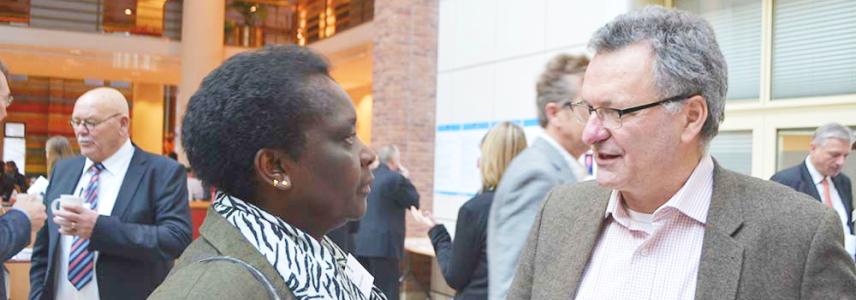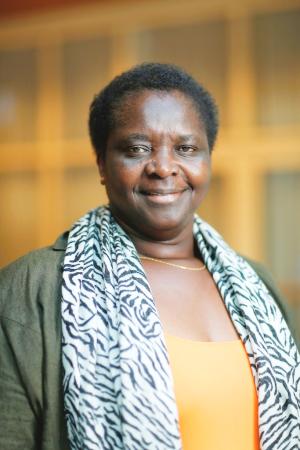Meet one of our local experts: Phoebe Owuor

Local experts play an important role in CBI’s projects. Their networks and knowledge of local policies and culture are extremely valuable. Phoebe Owuor, from Eldoret in Kenya, started working with CBI 30 years ago. She shares her experience working as a local and external expert.
How does a woman from Kenya start working with the Dutch Centre for the Promotion of Imports?

“I first met CBI in June 1991 during a joint project with the Kenyan Ministry of Trade. They were looking for women entrepreneurs to go into export. As part of the project, I went to Rotterdam for a 4-week training course at the World Trade Centre. I enjoyed it so much that, on the final night, I was given the opportunity to pass a vote of thanks on behalf of the participants. I got up in front of everyone and announced that one day I would come back to that same building as a coach. Everyone called me a dreamer. But my vision was clear: I wanted to share my knowledge on international trade.
I carried on studying and, in 1998, I started my own consultancy business in Kenya. In 2004, I worked with CBI again. This time, I took part in a one-year capacity building project to become a CBI consultant. When the project was over, CBI decided to train another group. I immediately volunteered to help so that I could learn on the job. I made my dream of returning as a coach come true!”
You now work as a local and external expert for CBI. These roles involve different tasks. What makes you ideal for both?
“Part of my role is to train small and medium-sized enterprises (SMEs) and business support organisations (BSO) on export development. I also develop and strengthen institutes that support export and trade within countries. What makes me an ideal partner for CBI is my knowledge of African countries and their cultures and my experience in international trade development. Also, I have a large network thanks to my work with development agencies and government ministries at local and international levels. The fact that I speak fluent English and Swahili is another advantage. But most important are my soft skills and my approach to sensitive and complex issues.”
As an external expert, you work on projects in various East African countries. Are there any that stand out?
“A recent project I managed focused on adding value to Kenyan tea. My role was to help develop an environment to put value-added teas on the international market. I also coordinated the work of the other consultants and experts involved.
This project stands out because of the fundamental changes it brought to the Kenyan tea sector. 8 factories decided to invest in packaging Kenyan tea at its origin. This added value to their product and increased their profits. Most of the factories embraced Corporate Social Responsibility (CSR) programmes. Simple changes to the working conditions also had a huge impact on women in the tea sector. They now work fewer hours and have access to better facilities such as toilets in tea collection centres.”
How has your work with CBI influenced you as a person?
“It has definitely shaped me. I have improved my skills, gained knowledge, and grown as a consultant and coach. Working with CBI has created opportunities for me and taught me to pursue excellence in my work. CBI has also benefited those around me. This job has helped me provide for my family and community. My children went to good schools and I helped other children get an education. I also helped provide fresh water for my community by having a borehole drilled in Kisumu County. And I sponsor local housing projects, too.
I still think that passing on knowledge is the greatest part of my work. I already have my eye on potential young consultants. I mentor and sponsor them so that they can take courses. Besides my work on CBI contracts, I soon hope to start an academy for young people in Kenya.”
Have there been any challenges along the way?
“Yes, especially in the beginning. I had to sacrifice a lot to take part in the training sessions. My children were young, and I often had to be away from home. Nowadays, my role includes bridging the gaps between cultures. Being the middle person is not always easy. But the hardest part is seeing people miss out on opportunities. CBI’s projects offer so much information and chances for growth. When you know the impact they can have, it is difficult to see people choose not to make the most of that.”
This year marks 30 years since you started working with CBI. What is next?
“In the coming years, CBI will expand its network of external experts. Focus areas include decent work, gender, youth, digitisation, and the environmental aspects of trade. The knowledge and participation of local experts are essential to creating inclusive and sustainable economies. So, what is next for me? Well, I want to keep learning and teaching, and I hope to continue doing so alongside CBI.”
More CBI stories
You can find this story and many others in our 50 years of CBI e-zine.